人教版九年级全册Unit13 We're trying to save the earth SectionA1a-2d课件+音频(共25张PPT,含内嵌视频)
文档属性
| 名称 | 人教版九年级全册Unit13 We're trying to save the earth SectionA1a-2d课件+音频(共25张PPT,含内嵌视频) |
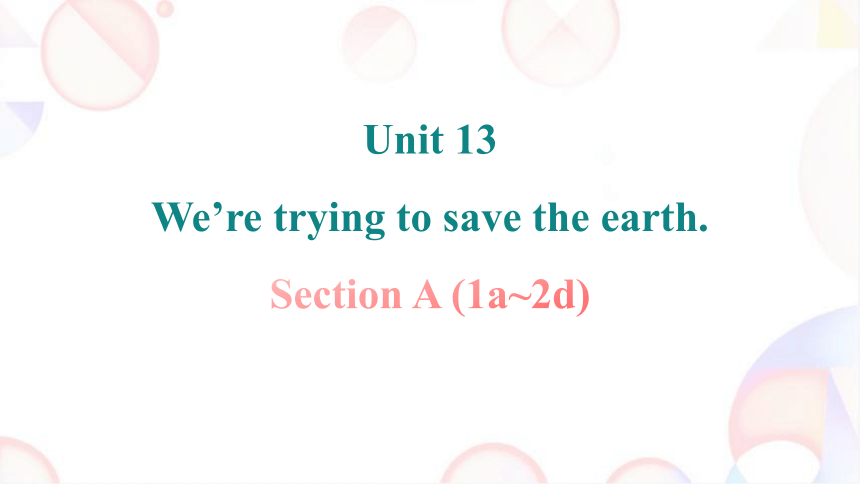
|
|
| 格式 | pptx | ||
| 文件大小 | 44.9MB | ||
| 资源类型 | 教案 | ||
| 版本资源 | 人教新目标(Go for it)版 | ||
| 科目 | 英语 | ||
| 更新时间 | 2024-09-21 09:35:41 | ||
图片预览

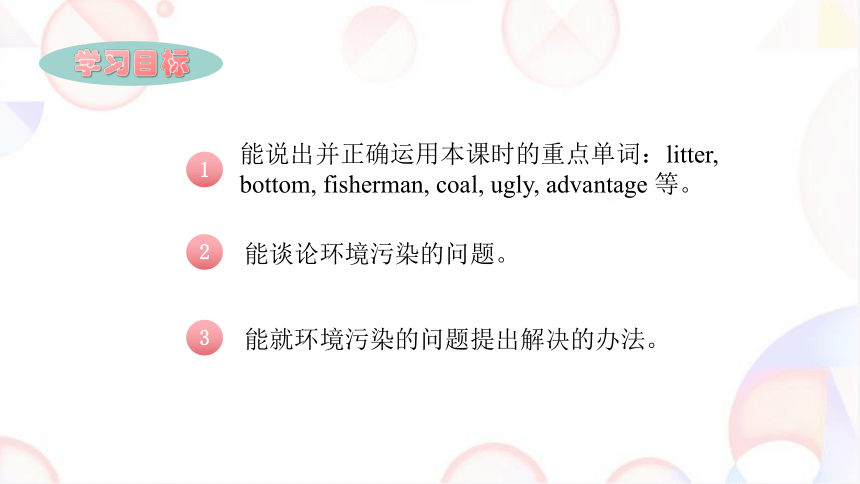
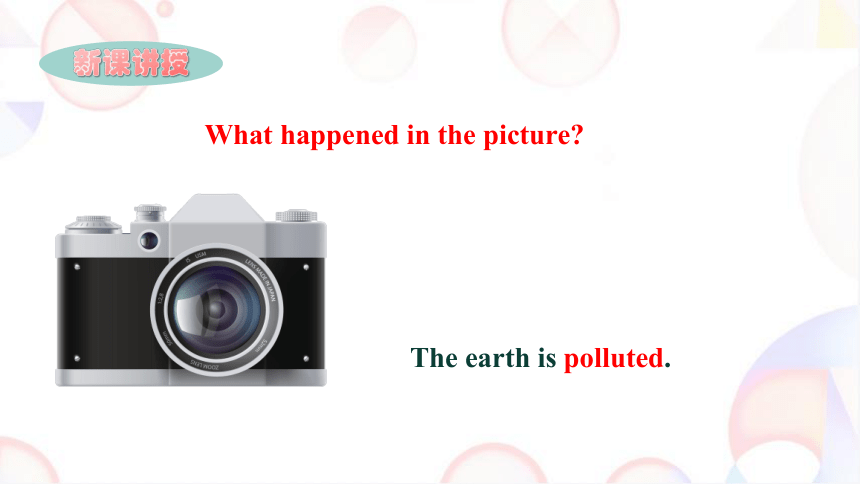
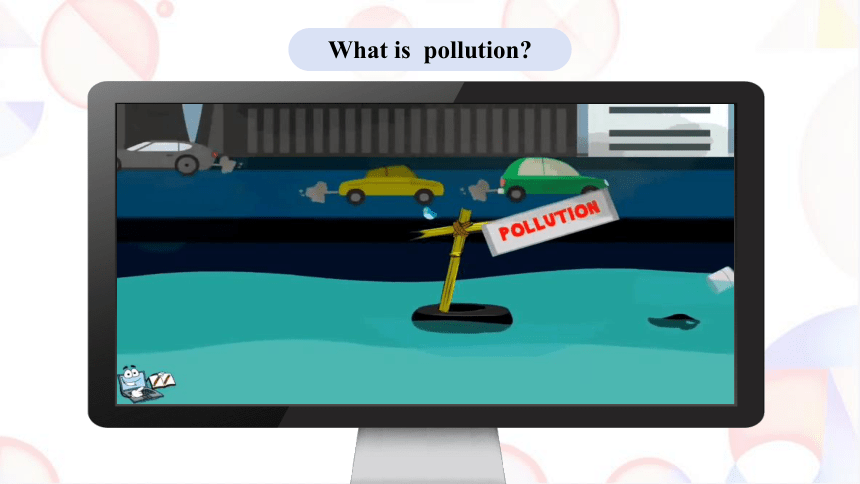
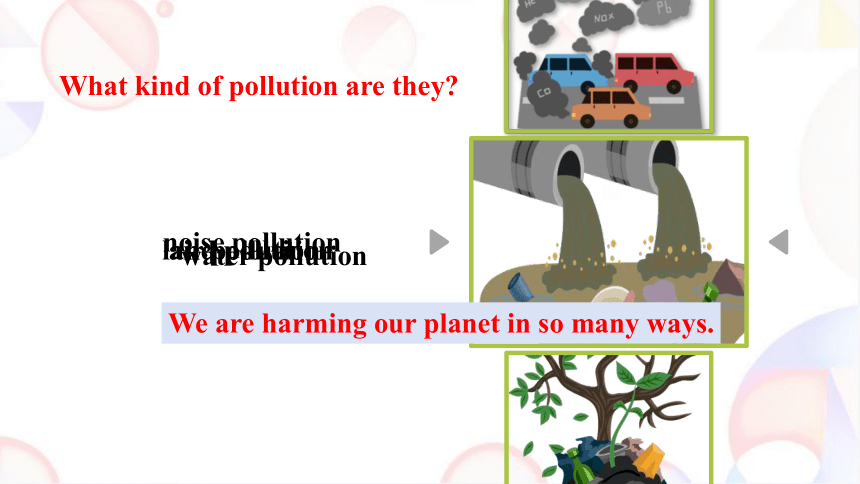
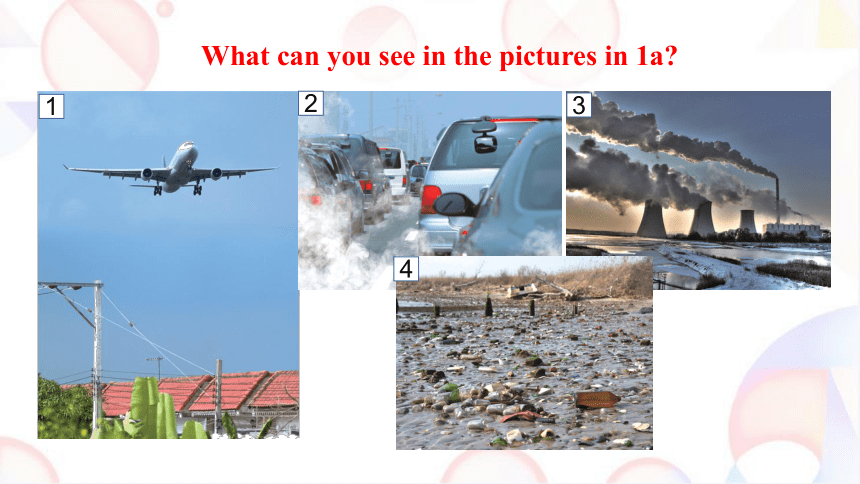
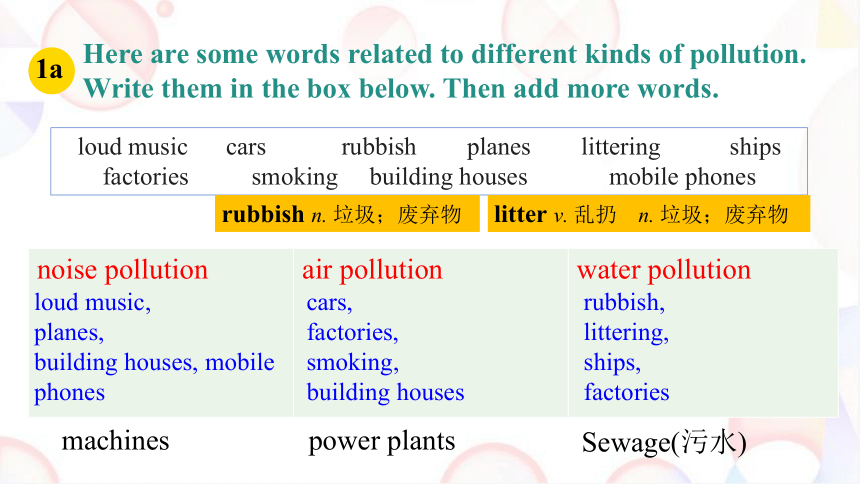
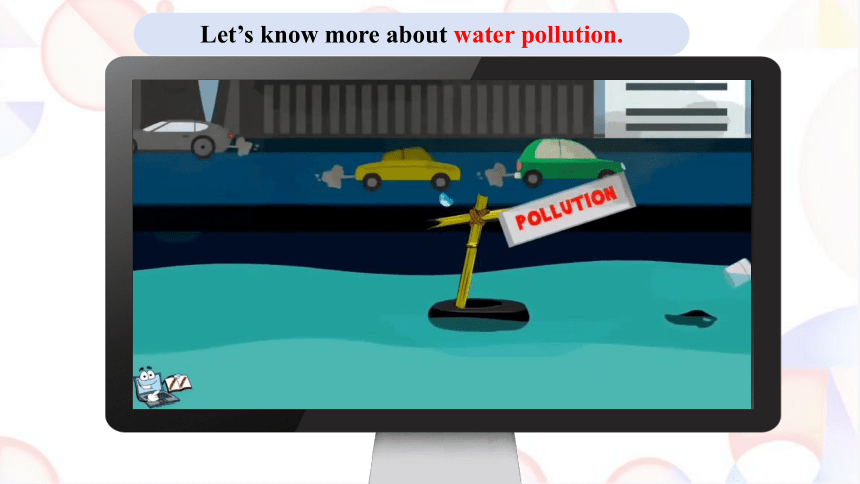
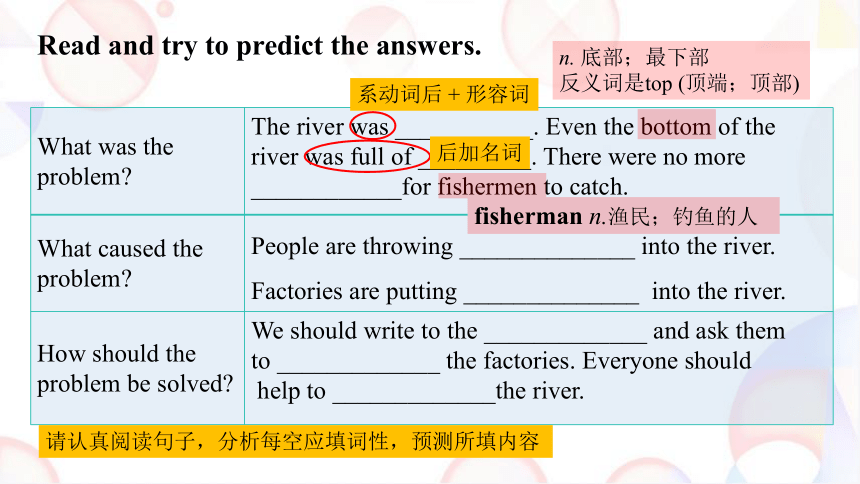
文档简介
(共25张PPT)
Unit 13
We’re trying to save the earth.
Section A (1a~2d)
学习目标
1
2
3
能说出并正确运用本课时的重点单词:litter, bottom, fisherman, coal, ugly, advantage 等。
能谈论环境污染的问题。
能就环境污染的问题提出解决的办法。
What happened in the picture
The earth is polluted.
新课讲授
What is pollution
What kind of pollution are they
land pollution
air pollution
water pollution
noise pollution
We are harming our planet in so many ways.
What can you see in the pictures in 1a
1
2
3
4
Here are some words related to different kinds of pollution. Write them in the box below. Then add more words.
1a
loud music cars rubbish planes littering ships factories smoking building houses mobile phones
litter v. 乱扔 n. 垃圾;废弃物
rubbish n. 垃圾;废弃物
noise pollution air pollution water pollution
loud music,
planes,
building houses, mobile phones
cars,
factories,
smoking,
building houses
rubbish,
littering,
ships,
factories
machines
power plants
Sewage(污水)
Let’s know more about water pollution.
Read and try to predict the answers.
What was the problem The river was ___________. Even the bottom of the river was full of _________. There were no more ____________for fishermen to catch.
What caused the problem People are throwing ______________ into the river. Factories are putting ______________ into the river.
How should the problem be solved We should write to the _____________ and ask them
to _____________ the factories. Everyone should
help to _____________the river.
系动词后 + 形容词
后加名词
请认真阅读句子,分析每空应填词性,预测所填内容
n. 底部;最下部
反义词是top (顶端;顶部)
fisherman n.渔民;钓鱼的人
Listen and complete the sentences.
1b
What was the problem
The river was __________. Even the bottom of the river was full of _______. There were no more _____ for fishermen to catch.
What caused the problem
People are throwing _______ into the river.
Factories are putting ______ into the river.
How should the problem be solved
We should write to the __________ and ask them to __________ the factories. Everyone should help to ________ the river.
really dirty
rubbish
fish
litter
waste
government
close down
clean up
Mark: The river was dirty. Even the bottom of
the river was full of rubbish.
Tony: But it used to be so clean!
Mark: Yes, but people are littering in the
river.
Tony: Everyone in this town should play a part in cleaning it up!
Role-play the conversation. Then make your own conversations about the kinds of pollution in 1a.
1c
参与……;在……方面起作用;
在……中扮演角色
problem
cause
solution
What causes the water pollution
People throw rubbish into the river.
Factories put the waste into the river.
What can we do to solve it
We can help to clean the river.
The government should close down the factories.
The government should make serious laws about water protection.
We should save water.
Listen to the interview. Circle the kinds of pollution that Jason and Susan talk about.
2a
A. land pollution
B. air pollution
C. noise pollution
D. water pollution
Let’s know more about soil/land pollution.
Let’s know more about air pollution.
2b
Listen again and complete the sentences.
1.The air is badly polluted because there are __________on the
road these days.
2.Factories that burn coal also ________ the air with a lot of
black smoke.
3.There is also too much rubbish and waste. People _________
________things every day.
4.People are also littering in _____________ like parks. This
is turning beautiful places into ugly ones.
more cars
are throwing
away
pollute
public places
What causes the land/soil pollution
There is too much rubbish and waste. People are throwing away things everyday
People use too many plastic bags.
What can we do to solve it
We should throw the rubbish into the bins.
We can help to clean up the streets or parks.
We'd better not use wooden chopsticks or plastic bowls when we buy takeaway food.
We can bring our own bag when we go shopping.
What causes the air pollution
What can we do to solve it
There are more and more cars on the road. They give off the waste gas into the air.
Factories that burn coal also pollute the air with a lot of black smoke.
We can walk or ride the bike, take the bus or subway instead of driving the car.
We can plant more trees.
The government should close down the factories.
Take actions to protect environment.
Read the conversation in 2d and fill in the chart.
Jason Susan
air pollution
waste pollution
Ride a bike.
Take the bus or subway instead of driving.
Bring a bag to go shopping.
remember to throw rubbish in the bins and keep public places clean and beautiful.
Never take wooden chopsticks or plastic forks when he buys takeaway food.
Role-play the conversation.
2d
Interviewer: Jason and Susan, what are your ideas for solving these problems
Jason: Well, to cut down air pollution, we should take the bus or subway instead of driving.
Susan: Yeah, or ride a bike. There are other advantages of bike riding. It’s good for health and it doesn’t cost anything!
Interviewer: Great ideas! What about waste pollution
Susan: Mmm, I think simple things like bringing a bag to go shopping can help. I started doing that a year ago.
Jason: Me, too. Also, I never take wooden chopsticks or plastic forks when I buy takeaway food. I use the ones at home.
Susan: And remember to throw rubbish in the bins and keep public places clean and beautiful for everyone.
Interviewer: So together, our actions can make a difference and lead to better future!
起作用,有影响
减少
the advantage of …“…的优点”
cost v. 花费;使付出指花费金钱,主语通常是物。
cost的过去式和过去分词均为cost。
How can we live a green life and save our earth
stop riding in cars
turn off the lights when we leave a room
recycle books and paper
If we all play a part in protecting the earth,
it will be better tomorrow.
1. There are other advantages of bike riding. (教材P98 2d)
advantage / d vɑ nt d /, / d v nt d / n. 优点;有利条件
advantage作名词,其反义词为disadvantage“缺点;不利条件”。
take advantage of ... 意为“利用......”。
Before making your decision, you should consider the advantages and disadvantages.
When possible, take advantage of this time to enjoy the nice weather.
Point
Language points
2. It’s good for health and it doesn’t cost anything! (教材P98 2d)
cost /k st/, /k st/ v. 花费
cost在此处作动词,过去式和过去分词均为cost。
The watch cost me 200 yuan.
【拓展延伸】cost还可作名词,意为“花费;价钱”。
Could you tell me the cost of the trip
Point
【易混辨析】cost, spend, take与pay
例词 主语 宾语 常用结构
cost 物 金钱 sth. cost(s) (sb.) some money某物花费(某人)多少钱
spend 人 时间或金钱 sb. spend (s) some time/ money on sth.某人花费时间/金钱在某事上
sb. spend(s) some time/ money doing sth. 某人花费时间/金钱做某事
take 常用it作形式主语 时间 it takes sb. some time to do sth.做某事花费某人多长时间
pay 人 金钱 sb. pay(s) some money for sth.某人为某物付费
Unit 13
We’re trying to save the earth.
Section A (1a~2d)
学习目标
1
2
3
能说出并正确运用本课时的重点单词:litter, bottom, fisherman, coal, ugly, advantage 等。
能谈论环境污染的问题。
能就环境污染的问题提出解决的办法。
What happened in the picture
The earth is polluted.
新课讲授
What is pollution
What kind of pollution are they
land pollution
air pollution
water pollution
noise pollution
We are harming our planet in so many ways.
What can you see in the pictures in 1a
1
2
3
4
Here are some words related to different kinds of pollution. Write them in the box below. Then add more words.
1a
loud music cars rubbish planes littering ships factories smoking building houses mobile phones
litter v. 乱扔 n. 垃圾;废弃物
rubbish n. 垃圾;废弃物
noise pollution air pollution water pollution
loud music,
planes,
building houses, mobile phones
cars,
factories,
smoking,
building houses
rubbish,
littering,
ships,
factories
machines
power plants
Sewage(污水)
Let’s know more about water pollution.
Read and try to predict the answers.
What was the problem The river was ___________. Even the bottom of the river was full of _________. There were no more ____________for fishermen to catch.
What caused the problem People are throwing ______________ into the river. Factories are putting ______________ into the river.
How should the problem be solved We should write to the _____________ and ask them
to _____________ the factories. Everyone should
help to _____________the river.
系动词后 + 形容词
后加名词
请认真阅读句子,分析每空应填词性,预测所填内容
n. 底部;最下部
反义词是top (顶端;顶部)
fisherman n.渔民;钓鱼的人
Listen and complete the sentences.
1b
What was the problem
The river was __________. Even the bottom of the river was full of _______. There were no more _____ for fishermen to catch.
What caused the problem
People are throwing _______ into the river.
Factories are putting ______ into the river.
How should the problem be solved
We should write to the __________ and ask them to __________ the factories. Everyone should help to ________ the river.
really dirty
rubbish
fish
litter
waste
government
close down
clean up
Mark: The river was dirty. Even the bottom of
the river was full of rubbish.
Tony: But it used to be so clean!
Mark: Yes, but people are littering in the
river.
Tony: Everyone in this town should play a part in cleaning it up!
Role-play the conversation. Then make your own conversations about the kinds of pollution in 1a.
1c
参与……;在……方面起作用;
在……中扮演角色
problem
cause
solution
What causes the water pollution
People throw rubbish into the river.
Factories put the waste into the river.
What can we do to solve it
We can help to clean the river.
The government should close down the factories.
The government should make serious laws about water protection.
We should save water.
Listen to the interview. Circle the kinds of pollution that Jason and Susan talk about.
2a
A. land pollution
B. air pollution
C. noise pollution
D. water pollution
Let’s know more about soil/land pollution.
Let’s know more about air pollution.
2b
Listen again and complete the sentences.
1.The air is badly polluted because there are __________on the
road these days.
2.Factories that burn coal also ________ the air with a lot of
black smoke.
3.There is also too much rubbish and waste. People _________
________things every day.
4.People are also littering in _____________ like parks. This
is turning beautiful places into ugly ones.
more cars
are throwing
away
pollute
public places
What causes the land/soil pollution
There is too much rubbish and waste. People are throwing away things everyday
People use too many plastic bags.
What can we do to solve it
We should throw the rubbish into the bins.
We can help to clean up the streets or parks.
We'd better not use wooden chopsticks or plastic bowls when we buy takeaway food.
We can bring our own bag when we go shopping.
What causes the air pollution
What can we do to solve it
There are more and more cars on the road. They give off the waste gas into the air.
Factories that burn coal also pollute the air with a lot of black smoke.
We can walk or ride the bike, take the bus or subway instead of driving the car.
We can plant more trees.
The government should close down the factories.
Take actions to protect environment.
Read the conversation in 2d and fill in the chart.
Jason Susan
air pollution
waste pollution
Ride a bike.
Take the bus or subway instead of driving.
Bring a bag to go shopping.
remember to throw rubbish in the bins and keep public places clean and beautiful.
Never take wooden chopsticks or plastic forks when he buys takeaway food.
Role-play the conversation.
2d
Interviewer: Jason and Susan, what are your ideas for solving these problems
Jason: Well, to cut down air pollution, we should take the bus or subway instead of driving.
Susan: Yeah, or ride a bike. There are other advantages of bike riding. It’s good for health and it doesn’t cost anything!
Interviewer: Great ideas! What about waste pollution
Susan: Mmm, I think simple things like bringing a bag to go shopping can help. I started doing that a year ago.
Jason: Me, too. Also, I never take wooden chopsticks or plastic forks when I buy takeaway food. I use the ones at home.
Susan: And remember to throw rubbish in the bins and keep public places clean and beautiful for everyone.
Interviewer: So together, our actions can make a difference and lead to better future!
起作用,有影响
减少
the advantage of …“…的优点”
cost v. 花费;使付出指花费金钱,主语通常是物。
cost的过去式和过去分词均为cost。
How can we live a green life and save our earth
stop riding in cars
turn off the lights when we leave a room
recycle books and paper
If we all play a part in protecting the earth,
it will be better tomorrow.
1. There are other advantages of bike riding. (教材P98 2d)
advantage / d vɑ nt d /, / d v nt d / n. 优点;有利条件
advantage作名词,其反义词为disadvantage“缺点;不利条件”。
take advantage of ... 意为“利用......”。
Before making your decision, you should consider the advantages and disadvantages.
When possible, take advantage of this time to enjoy the nice weather.
Point
Language points
2. It’s good for health and it doesn’t cost anything! (教材P98 2d)
cost /k st/, /k st/ v. 花费
cost在此处作动词,过去式和过去分词均为cost。
The watch cost me 200 yuan.
【拓展延伸】cost还可作名词,意为“花费;价钱”。
Could you tell me the cost of the trip
Point
【易混辨析】cost, spend, take与pay
例词 主语 宾语 常用结构
cost 物 金钱 sth. cost(s) (sb.) some money某物花费(某人)多少钱
spend 人 时间或金钱 sb. spend (s) some time/ money on sth.某人花费时间/金钱在某事上
sb. spend(s) some time/ money doing sth. 某人花费时间/金钱做某事
take 常用it作形式主语 时间 it takes sb. some time to do sth.做某事花费某人多长时间
pay 人 金钱 sb. pay(s) some money for sth.某人为某物付费
同课章节目录
- Unit 1 How can we become good learners.
- Section A
- Section B
- Unit 2 I think that mooncakes are delicious!
- Section A
- Section B
- Unit 3 Could you please tell me where the restroom
- Section A
- Section B
- Unit 4 I used to be afraid of the dark.
- Section A
- Section B
- Unit 5 What are the shirts made of?
- Section A
- Section B
- Review of Units 1-5
- Unit 6 When was it invented?
- Section A
- Section B
- Unit 7 Teenagers should be allowed to choose their
- Section A
- Section B
- Unit 8 It must belong to Carla.
- Section A
- Section B
- Unit 9 I like music that I can dance to.
- Section A
- Section B
- Unit 10 You're supposed to shake hands.
- Section A
- Section B
- Review of Units 6-10
- Unit 11 Sad movies make me cry.
- Section A
- Section B
- Unit 12 Life is full of the unexpected
- Section A
- Section B
- Unit 13 We're trying to save the earth!
- Section A
- Section B
- Unit 14 I remember meeting all of you in Grade 7.
- Section A
- Section B
- Review of Units 11-14
